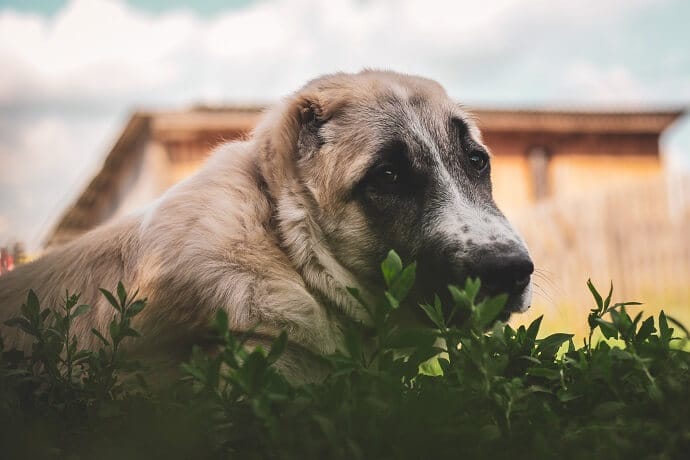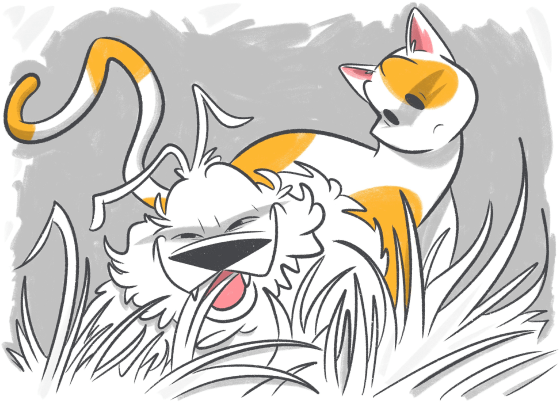As a devoted paw parent to a dog, you spend a great deal of effort and money to ensure that your dog is well cared for and fed on nutritious, specialized dog food. So, it’s always a bit perplexing when you find your canine companion eating grass.
Why do dogs eat grass? Is it normal or should you be worried? What should you do if your dog is eating grass?
We’ve got the scoop. No, not that scoop. We mean the full story on why your pup is channeling their inner goat.
Stop Googling - Ask a Real Vet
Why does my dog eat grass?
The good news is that it is completely normal and extremely common for dogs to eat grass. Occasionally, it can help indicate something more serious, but generally, it’s pretty harmless.
Many canines in the wild have been observed eating grass, so it isn’t an uncommon thing for the species as a whole. Your sweet pooch may have many reasons for munching down on the grass.
- Stomach problems
Why do dogs eat grass and throw up? It’s commonly accepted that your dog eats grass because they are most likely feeling unwell and eating grass to cause vomiting to clear out their stomach. But there’s no hard and fast evidence of which behavior causes which. Does your dog vomit because they ate grass? Or did your dog eat grass and then throw up?
If your dog eats grass, it is also believed that they do this to help them purge intestinal parasites, which is why sometimes your dog will eat grass and throw up.
- Instinct
It’s a common belief that dogs are true carnivores when in fact they are naturally omnivorous, which means they are adapted to eating both meat and plants. In the wild, it’s not uncommon for dogs to eat plants.
Usually, this is unintentional – when they consume their prey, they often consume the stomach contents of that animal as well, and the stomach is usually filled with grass.
- Poor diet
Eating grass can oftentimes be a way for your dog to supplement a diet lacking in certain nutrients, or it could be a way for your dog to add fiber to their menu. This might be your pup’s way of suggesting a food upgrade. Chat to your vet about food options that might help address the problem.
- They like it
Some dogs just really like eating grass. If your dog bolts outside every day to nosh down on the lawn and it doesn’t cause any adverse effects then that might be a sign that your pooch just likes to eat grass.
It could be the taste or it could be the texture. It might happen on certain types of grass only, or only at certain times of the year, like in the spring. Either way, it’s not uncommon and it isn’t always a cause for any concern.
- Psychological reasons
Puppies and younger dogs often nibble on grass as a way to relieve boredom. A stressed or anxious pup will also eat grass. If you suspect this to be the case, take a step back and assess your dog’s lifestyle. Has there been a drastic change in their life? Are you giving them enough exercise and stimulation?
It may also be a tactic to get attention. To your dog, any attention is good attention, so they may pursue behaviors that cause you to react in any way, good or bad.
If your dog eats grass, it could be pica, a condition where humans and animals have an urge to consume items that aren’t food. This will lead your pooch to obsessively chew and swallow things like paper, sand, fabric, and even wood.
If you suspect your dog has pica, chat with your vet or drop a line to Online Vet as soon as you can.
Is it safe for dogs to eat grass?

If your dog does eat grass, for the most part, it’s considered safe as long as it doesn’t cause them to vomit repeatedly, have diarrhea, or drink water excessively.
Grass can sometimes harbor intestinal parasites from the droppings of other animals. You should regularly treat your pup for intestinal parasites, but even more diligently if your pooch has a taste for grass.
Pesticides, herbicides, fertilizers, and other lawn treatments can contain ingredients that are not good for your dog to consume. Be conscious of what you put on your lawn at home if your dog eats grass in the yard.
When should I start worrying?
Dogs are generally susceptible to digestive issues, some of which can be very dangerous but can be treated by your vet. So it’s a good idea to pay close attention to any drastic changes in their behavior.
If there’s a sudden increase in grass consumption or your pup is vomiting repeatedly after eating grass — these may be signs it’s time to visit the vet.
If your dog regularly eats grass, there’s probably no need for concern, even if this does cause them to vomit. If it’s a continuous cycle of eating grass and vomiting, and then quickly eating grass again and repeating the cycle, then it’s a good idea to consult a vet.
If your dog is displaying a pica-like obsession with eating grass or any non-food items, get them to a vet sooner rather than later. The eating of non-food items can cause poisoning or blockages in your dog’s digestive tract, so it’s best not to ignore the signs.
Poisoning and blockages in your pet are emergencies that require immediate veterinary care. Because incidents like these may come unexpectedly, it is essential for pet owners to be aware and take the necessary measures to be prepared in case it happens. Case in point, investing in a pet insurance alternative such as Petcube’s Pet Emergency Fund is well worth it for your pet’s health and your peace of mind.
A Pet Emergency subscription gives you $3000 per year for upto 6 pets. This also gives you access to 24/7 emergency vet help through their online vet service. Luckily, we are giving our blog readers (including you) an exclusive 27% discount on subscriptions if you follow this link.
Should I get my dog to stop eating grass?
Finding the root of your dog’s need to consume grass will usually lead to the behavior coming to an end. For example, if your dog eats grass out of boredom or frustration, providing adequate stimulation and exercise will most likely cause your pup to stop eating grass.
But generally, if your dog is nibbling the lawn occasionally without any negative effects, there’s no need to worry and no need to change the behavior.
If you want to discourage your dog from eating grass, you can use a combination of consistent correction and positive reinforcement in the form of verbal praise and treats to encourage your pup to not eat grass.
Distract them or redirect them from the grass and then reward them for not eating it.
Was this article helpful?
Help us make our articles even better









